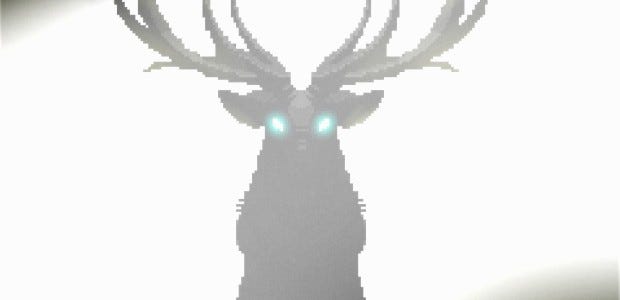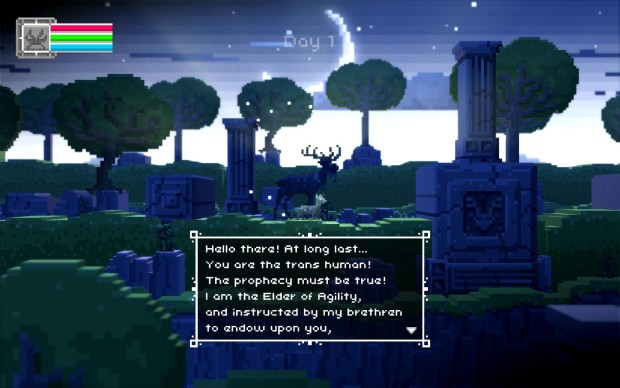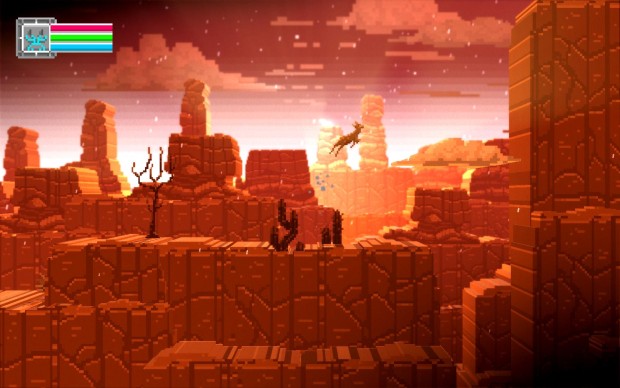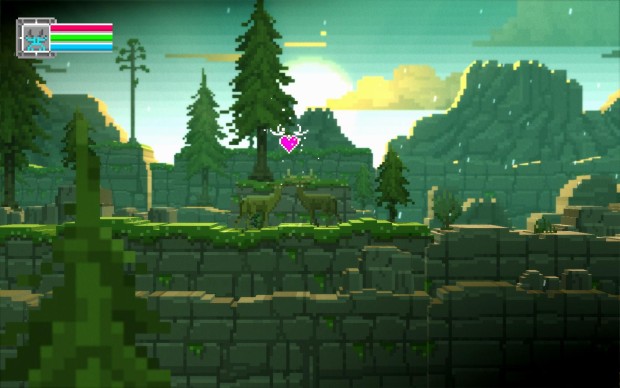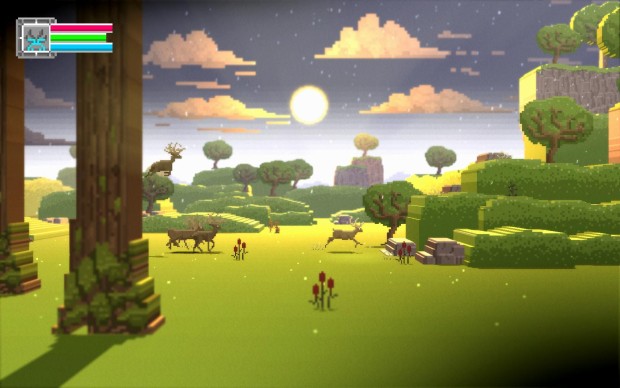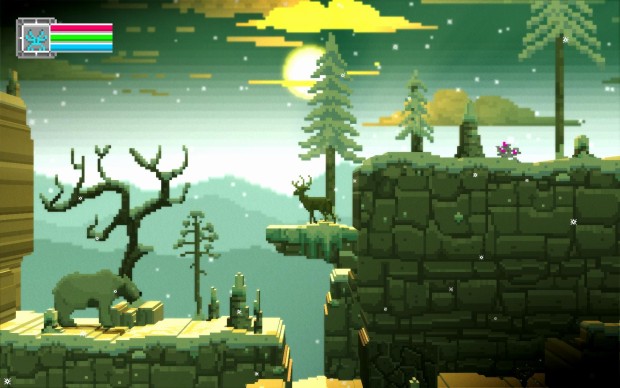Premature Evaluation: The Deer God
Save your bucks
Each week Marsh Davies launches himself into the bestial bloodbath that is Early Access and comes out with whatever stories and/or handfuls of porcupine innards he can find. This week he gets his game on in the weird woodland-themed survival-platformer hybrid that is The Deer God.
And today in Least Fulfillable Game Development Promises: The Deer God “will challenge your religion and your platforming skills”. Presumably they didn’t hit the stretch goal for a full Damascene Conversion, but, still, that’s a loftier aim than making the player John Romero’s bitch. The Kickstarter blurb also mentions that the game is “dedicated to a small cardinal, whom I ran over recently,” which, if taken in the spirit of Thomas More, might well involve a robust challenge to religion - but I think the author probably just means the bird.
In the event, The Deer God has only challenged my patience so far, but it does start out with a little doctrinal shake up: a hunter reaches the Pearly Gates - via a gruesome mauling by wolves - and discovers that God is, in fact, a ruminant. And She isn’t best pleased about his penchant for venison burgers. Cue reincarnation as a baby deer, forced into a fittingly punitive collision of platformer, endless-runner and survival roguelike.
You run and you jump - almost entirely towards the right of the screen - as an endless voxel landscape is assembled from soon-repeating level-chunks. You eat shrubs and fruits, and as you do you grow bigger and can jump farther, run faster, headbutt harder. And there’s a lot of headbutting. Attenborough has been lying to us with his accounts of herds nervously masticating in grassy fields. No “press E to secrete musk” here, only unremitting violence against unlikely woodland foes: porcupines, owls and pigs all want a piece of you, not to mention more traditional predators. Each will pursue you ceaselessly until you turn round and nut their health bars off, or otherwise lead them to their deaths in the many pits of spikes that have inexplicably sprouted across this otherwise idyllic world.
When death comes - as it does frequently - it’s mostly as a result of an arbitrary coalescence of misfortunes that you are helpless to resist. Perhaps you run headlong into a massive scrum of wolves, bears, pigs and rival stags. Unified by their hatred of player characters, they pelt after you at a speed greater than your own, their merest touch enough to rip a chunk off your health bar. The only viable tactic, in such circumstances, is to arrange yourself near a forest fire and leap back and forth over both flames and animals until your zig-zagging pursuers are suitably crisped. But most of the time you’ll just die.
At which point: welcome back to the main menu! 2014 was the year that rogue came back in vogue, and it seems every game hopes permadeath will add a bit of pepper to their stakes. But in The Deer God permadeath is dealt out unjustly and serves no purpose but to retard progress. The difference between being screwed by happenstance in Spelunky and this is that, even when the odds are stacked against you in Spelunky, success is always possible at the outset, and there are dozens of ways to massage those odds in your favour - even if you may fail to do so. Every jump, every whiplash, is part of a much broader arsenal of interactions that engage the player at the tactile level, at the tactical level and at the strategic level, and failure shakes up the game’s variables in exciting ways. In The Deer God, you move to the right and hope you don’t get mobbed by lots of enemies and have to start the monotony again. There is no strategic thinking that emerges from that prospect and there are precious few tactics to overcome it.
Assuming you have a lucky run, you gradually grow into an adult deer, and can complete challenges offered up by repeated encounters with the same randomly combined level chunks. Some of these challenges will earn you powerful rewards which enable you to access new areas of said level-chunks, previously concealed by large not-as-yet-smashable boulders. Beyond the simple motivation of survival, there’s a loose narrative escalation about achieving karmic balance which is tied to the reanimation of ancient statues by way of block-pushing puzzles, but permadeath really saps your will to do this makework again and again and again.
There is a save system of sorts, in the form of fertile does - assuming the random number generator is kind enough to provide you with any on your journey. Stand beside one for long enough and a heart grows above your heads - then, pop! Out comes a baby deer. In theory these now act as a save point, with your spirit reincarnating in the next generation upon your death - just like with real children.
Problem is, it doesn’t often work, for reasons that remain unclear to me. And even if it did it’d be meaningless: progress is mostly gated by your avatar-deer’s maturity, not by your physical location in a randomly compiled infinite landscape. Besides which, reincarnating as a baby deer and then tottering into the scenario which just killed you as a vastly more capable adult doesn’t seem like much of an act of mercy.
It’s a real shame The Deer God is so hamstrung by its system of non-progression and by its duff beast-on-beast combat. Admittedly, that’s pretty much the entirety of the game’s substance but many of the incidental details are rather lovely. Just look at it. Just listen to it. The way one biome careens into another and the way weather and the day-night cycle recast the character of every location gives the game a life that is lacking from its actual mechanics. And as its randomised scenes roll past, you encounter characterful vignettes, trotting past a shootout in a frontier town or a haunted bayou riverboat. They aren’t deeply interactive, but their rarity gives the random number generator a sense of purpose and personality.
There’s definitely something interesting in the idea of reincarnation, too - the new generation will often try to follow you and instantly fall to its death (though I’ve not been able to detect a definite correlation between that and whether the save system deigns to work or not). Making chaperoning them feasible and meaningful act might make that system feel whole. Apparently, the wanton slaughter of non-aggressive animals will shift your karmic balance, too, increasing the chance that you might reincarnate as an even lesser beast. But there are no meaningful interactions that follow such a consequence, so you might as well just start again.
Presently, The Deer God feels like a gameworld in search of a purpose, and its metaphysical metaphors only exist to prevent you from seeing it properly. Will it yet supercede its structural misadventures? Will it yet breed richer interactions with its bestiary? Will it yet challenge your religion? I wouldn’t take it on faith.
The Deer God is available on Steam Early Access for £7 and looks to launch properly early next year, so there’s not a lot of time to completely overhaul the things I disliked about it in version 1.0.0.0, available 11/12/2014. But then again, it’s got largely positive Steam reviews, so maybe it’s just not for me.
